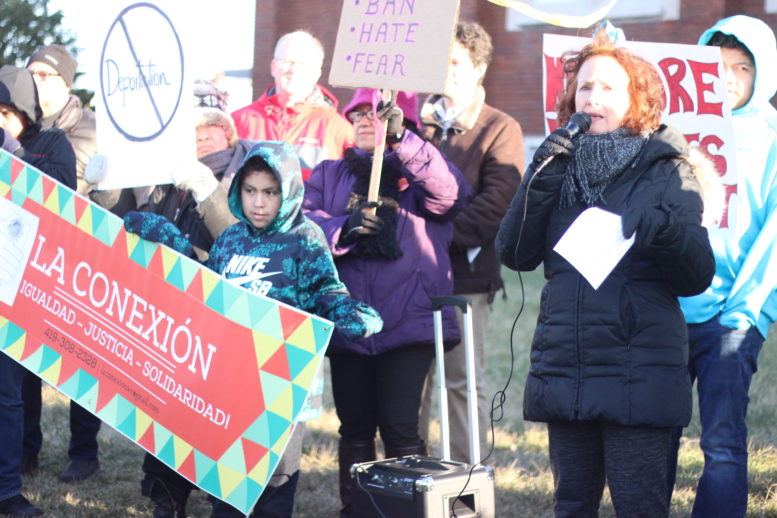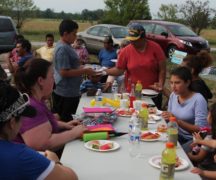By DAVID DUPONT
BG Independent News
Between the words “illegal” and “undocumented” sits a gulf of misunderstanding.
Reading stories on the concern and fear in the immigrant community, a number of people write: “They’re illegal.” For them that settles the matter.
For those who work with and advocate for immigrants who lack the proper paperwork to continue living in a place that has become their home, that response neglects their history and day-to-day fears.
Those fears are real, according to Beatriz Maya of La Conexion de Wood County. When La Conexion hosted a session with legal experts from Advocates for Basic Legal Equality in Toledo, some undocumented immigrants were unwilling to show up for fear of being identified.
The meeting, though, was well attended by those who want to stand in provide the voice for their undocumented neighbors and want to work on their behalf.
That Immigrant Solidarity Committee will hold an ice cream social including a silent auction Sunday, April 30 at 2 p.m. at the First Presbyterian Church, 126 S. Church St., in Bowling Green.
The event will spread awareness, discuss future plans, and raise money to help with expenses undocumented residents may have because of sudden deportations.
“They are really afraid,” Maya said. “If they were afraid before, now it was just terror. They didn’t want to go to rally. We need people who can do solidarity work and be the voice of the immigrant community.”
Margaret Weinberger, of Bowling Green, was one of those who attended the March session. The stories she heard about what is happening as close as Lucas County were chilling, she said.
Immigration and Customs Enforcement followed a man who was bringing his daughter to school. They waited for him to drop her off – they are ill-equipped to handle children – and then apprehended the father, Weinberger said.
He didn’t get a telephone call. Undocumented immigrants have no rights. His wife had no idea where he was.
An ABLE lawyer, Maya said, spelled out what under the law someone stopped can do. He encouraged people to videotape their encounters.
But someone in attendance said he’d be concerned that doing that would influence his treatment later. Maya said the lawyer was blunt: “I can only tell you what the law says you can do. What is actually going to happen with this particular agent I don’t know.”
There are an estimated 11 million undocumented immigrants in this country.
Not all are Mexican, Weinberger noted. Nor are all farm workers. Service industries, food processing, all use undocumented workers.
Maya said that an influx of Mexicans came to the United States after the passage of the North American Free Trade Agreement. The trade deal disrupted the agricultural economy by opening the country up to cheap food imports from the United States. Also a growing culture of violence forced others to flee.
And there was a demand here for cheap labor, she said. Recruiters set up shop south of the border to entice people to come to the United States.
“People would get here and say ‘I want to get my papers.’ They were coming and didn’t know there was no chance to get them,” said Maya, who worked for the Farm Labor Organizing Committee for 20 years.
Weinberger said when she was in high school she worked with migrant workers in the area. “I know how essential farm labor has been,” she said. “In this particular area, workers, who may not have been documented at the time, were welcomed and encouraged and knew they had a regular job. They have children here and are an important part of the economy.”
Then the rules change. In 1996 undocumented workers who had been here for a certain amount of time had to return to Mexico to have any hopes of getting their documents.
“Even that process isn’t cheap,” Maya said.
“And it disrupts families,” added Weinberger
Many have tried, Maya said, through various channels, some illicit, to get their paperwork. Many times all that happens is they lose money.
They want to get their documentation “more than anything in the world,” Maya said. “And that’s something people don’t understand – they can’t.”
Earlier this year, Eugenio Mollo, ABLE’s managing attorney, said he prefers the term “undocumentable” to “undocumented.”
“These people who are absolutely hard workers, in many instances they didn’t know under what conditions they were coming,” she continued “There’s a whole system that develops to bring this workforce here and to keep it here in a vulnerable state.”
Amanda Schackow knows the difficulty and cost of trying to get legal documentation. She’s been trying to bring her wife, a Swiss-German citizen, to live here permanently. They tried before they were married to use a fiancé visa, but because Schackow’s wife has a neurological disorder, they were refused. Their immigration attorney told them that Schackow didn’t earn enough to assure the government “she wouldn’t be a burden.”
So the months pass, the paperwork piles up, and the expenses mounts. “This is not something someone who is disadvantaged can do,” she said. “It’s not simple.”
“We have to keep pushing for immigration reform,” Maya said. The last major overhaul of the law was in 1952.
Over the years reform proposals have been made. A major initiative by President George W. Bush, which he came to Toledo in 2001 to promote, was derailed because of the 9/11 attacks.
Proposals, Maya said, have fallen victim to partisan wrangling. U.S. Sen. John McCain (R-Arizona) “had probably the best proposal there was,” she said. “Of course, the Democratic Party went against that and so on and then nothing happened.”
“In the meantime we need to try to make our local communities welcoming and safe,” she said.
The resolution that passed in Bowling Green was an significant step, Maya said. “It’s important to extend that resolution to the county, to other towns. … That’s something the solidarity committee can do.”





